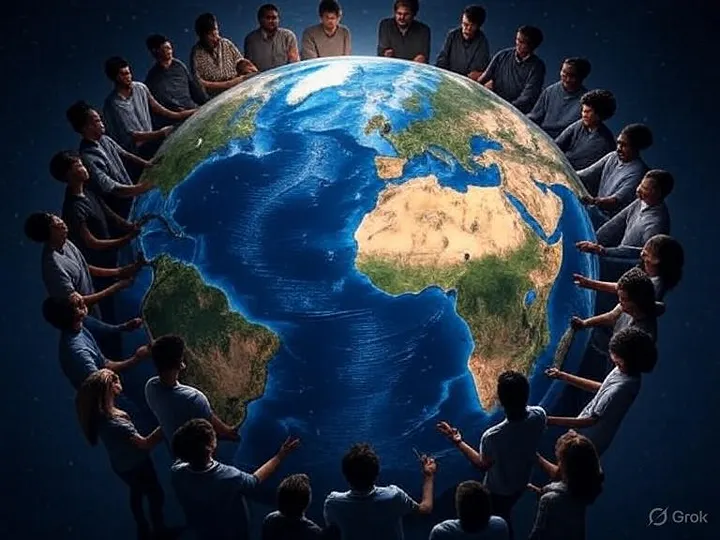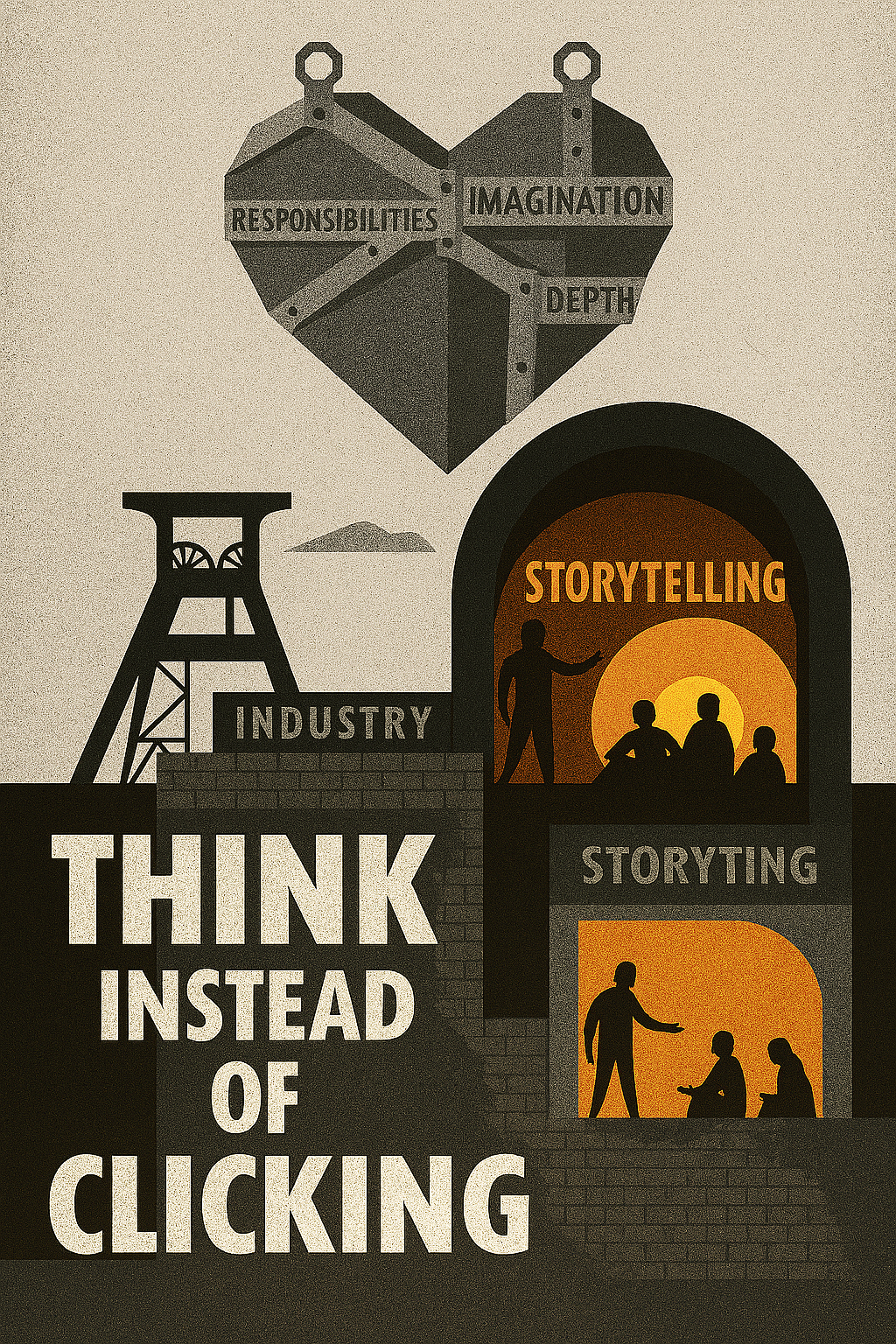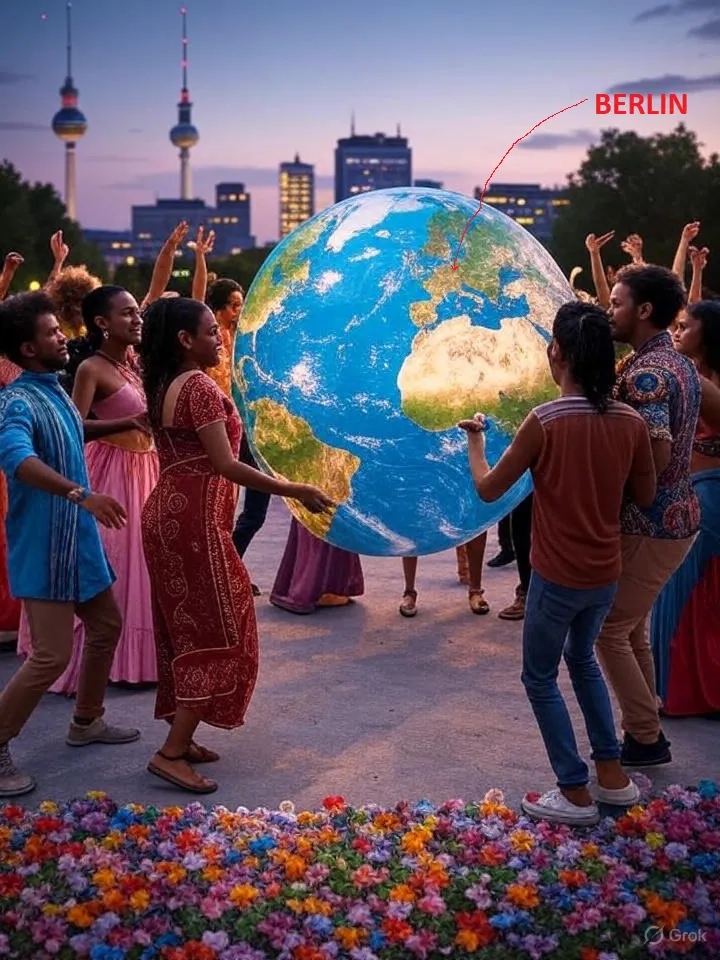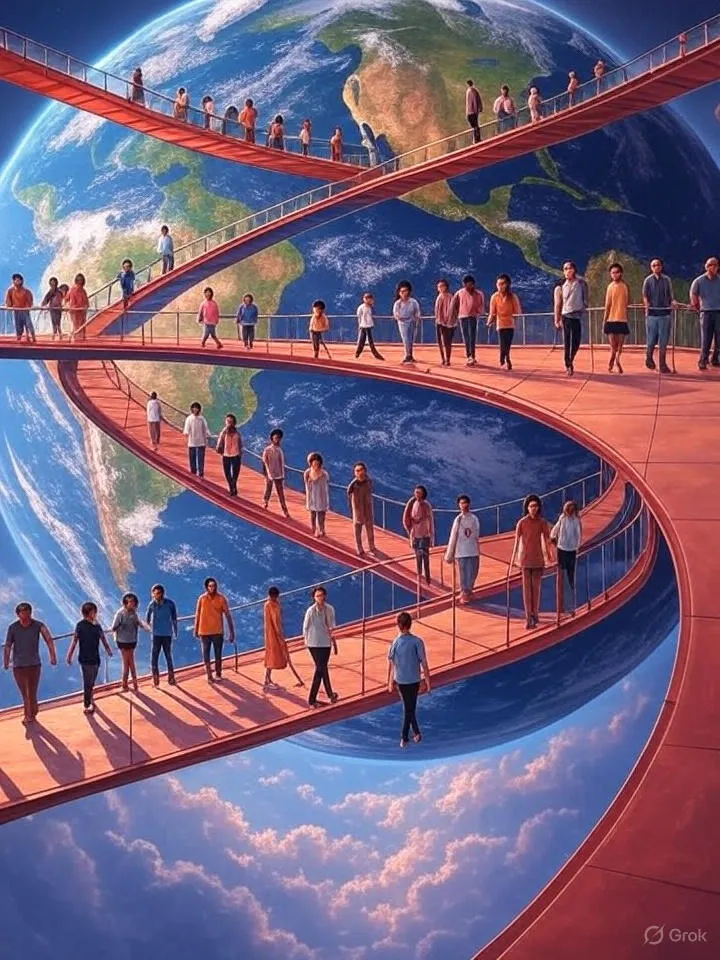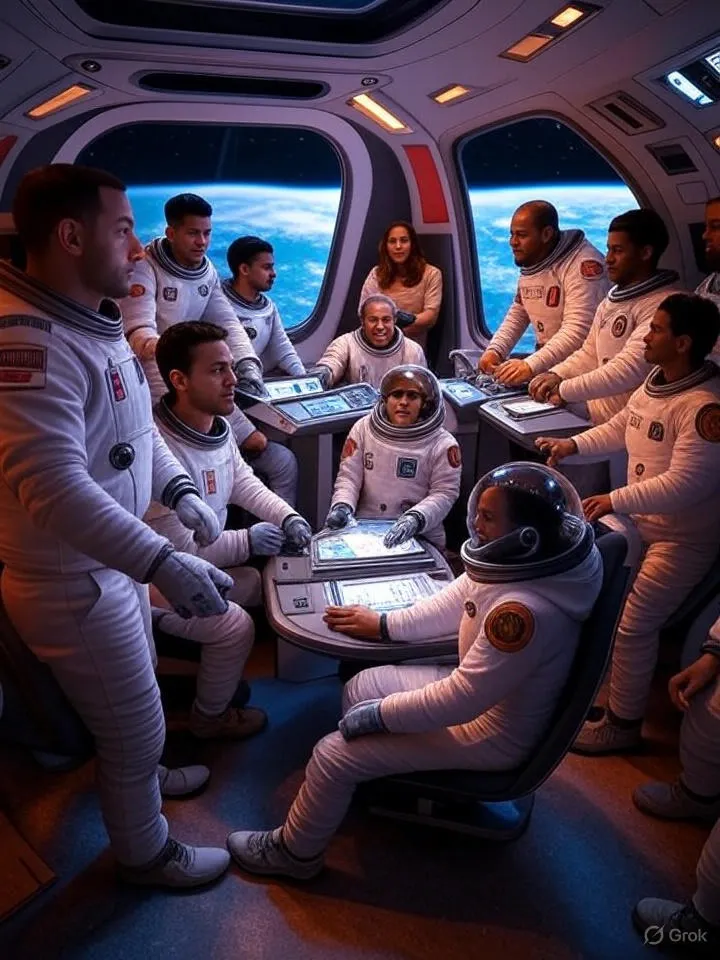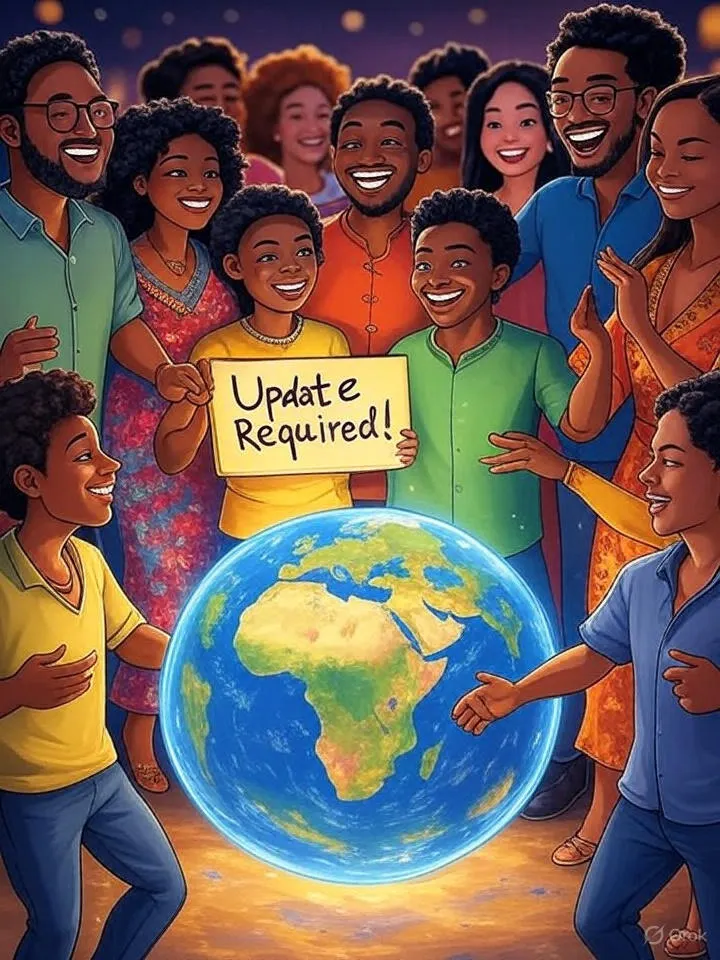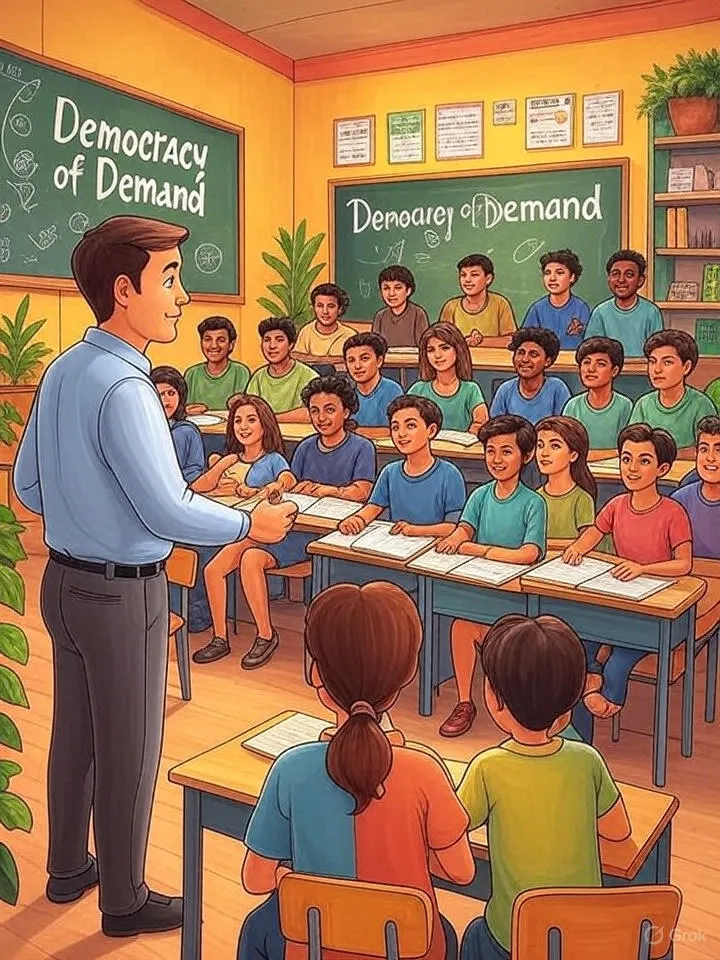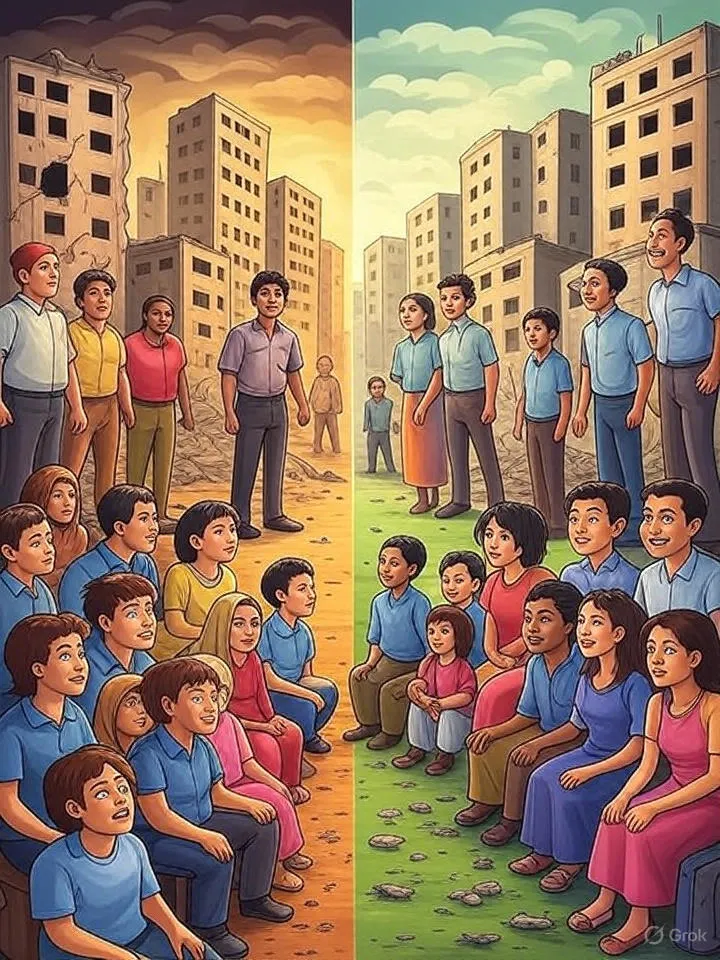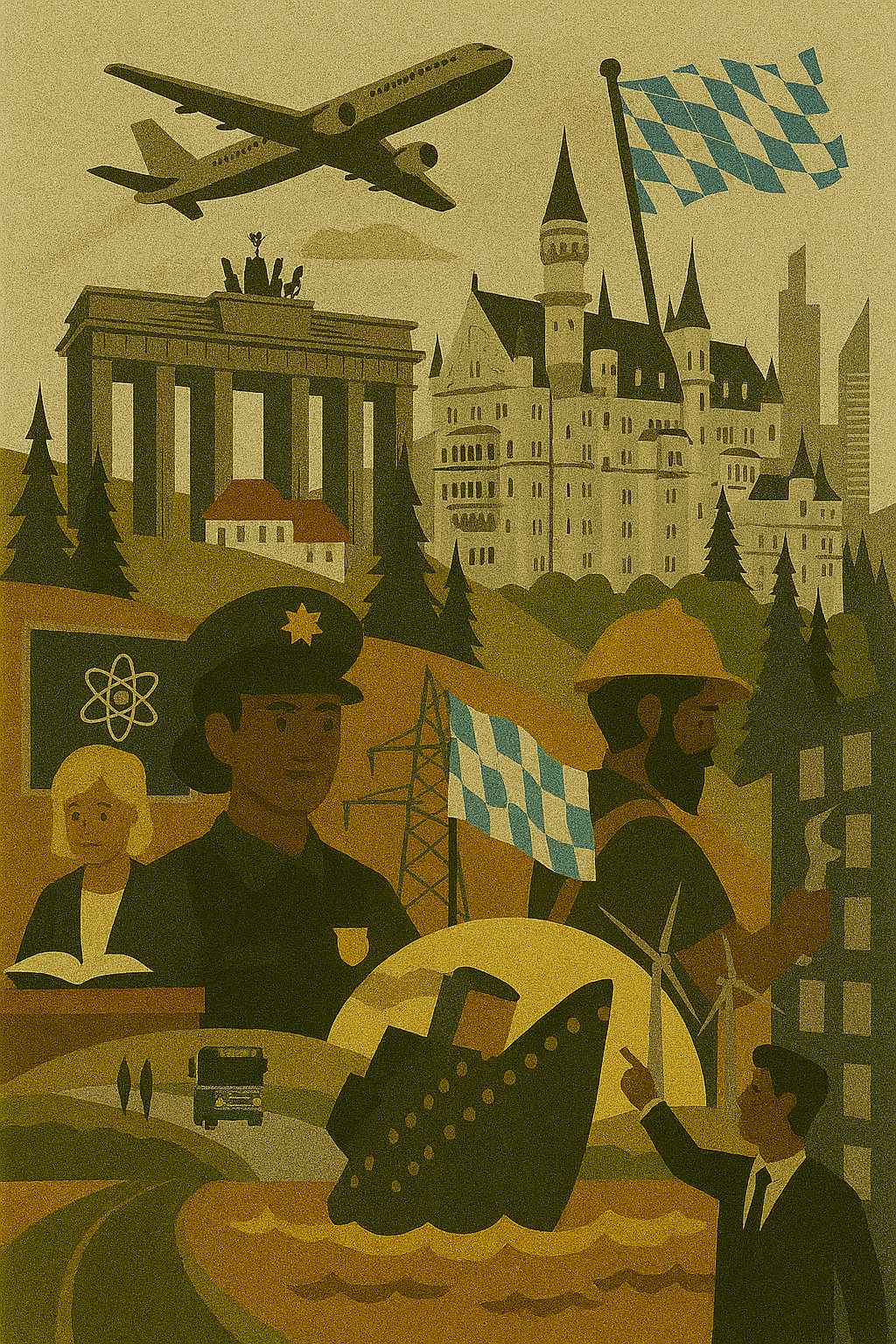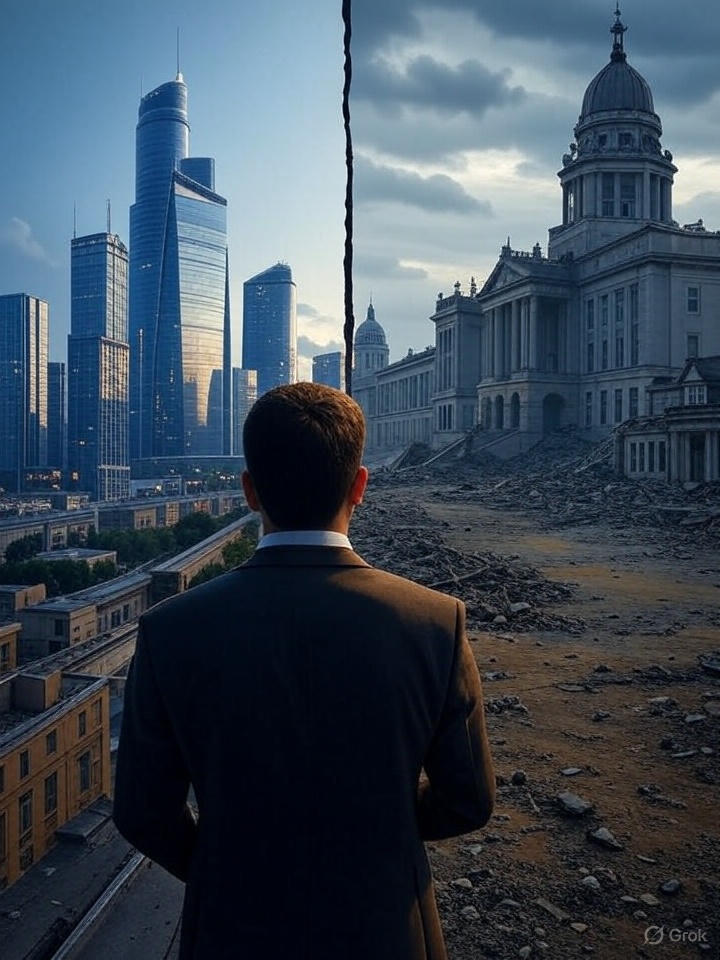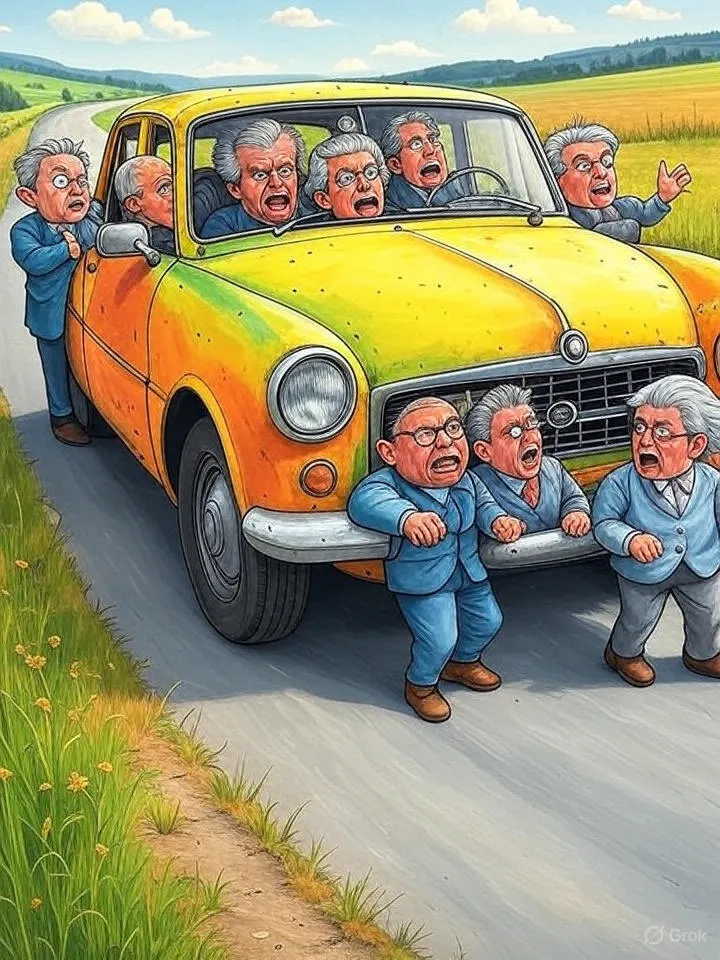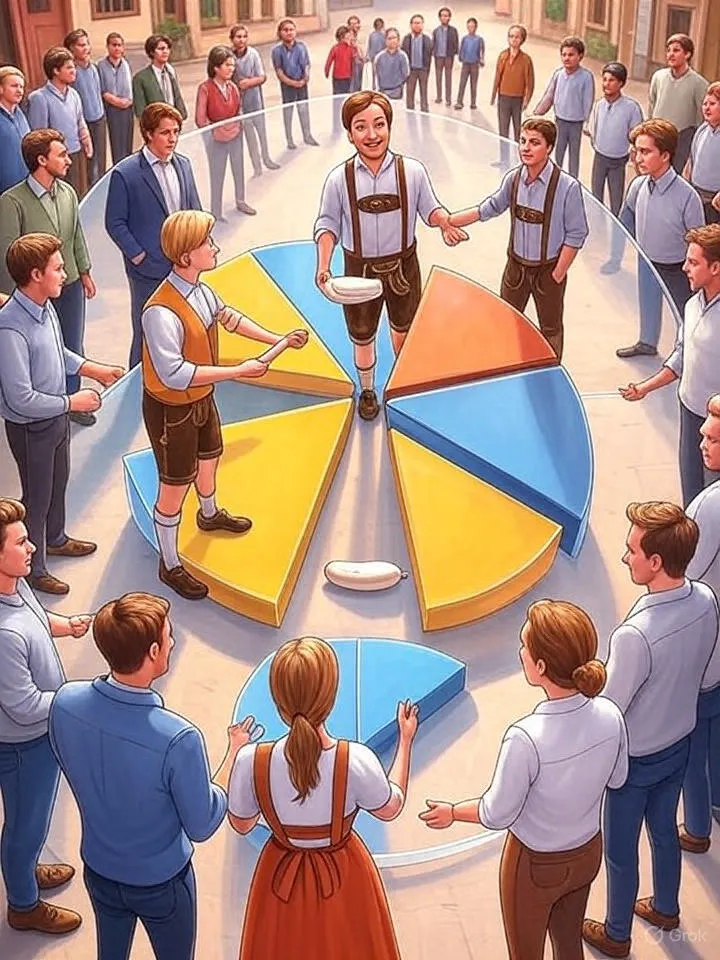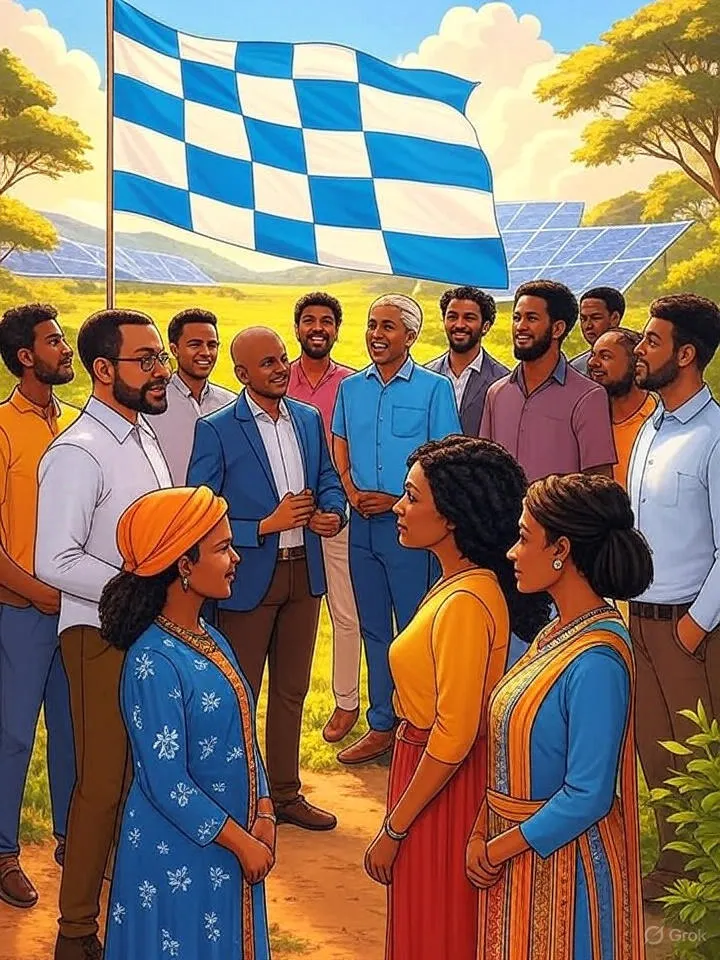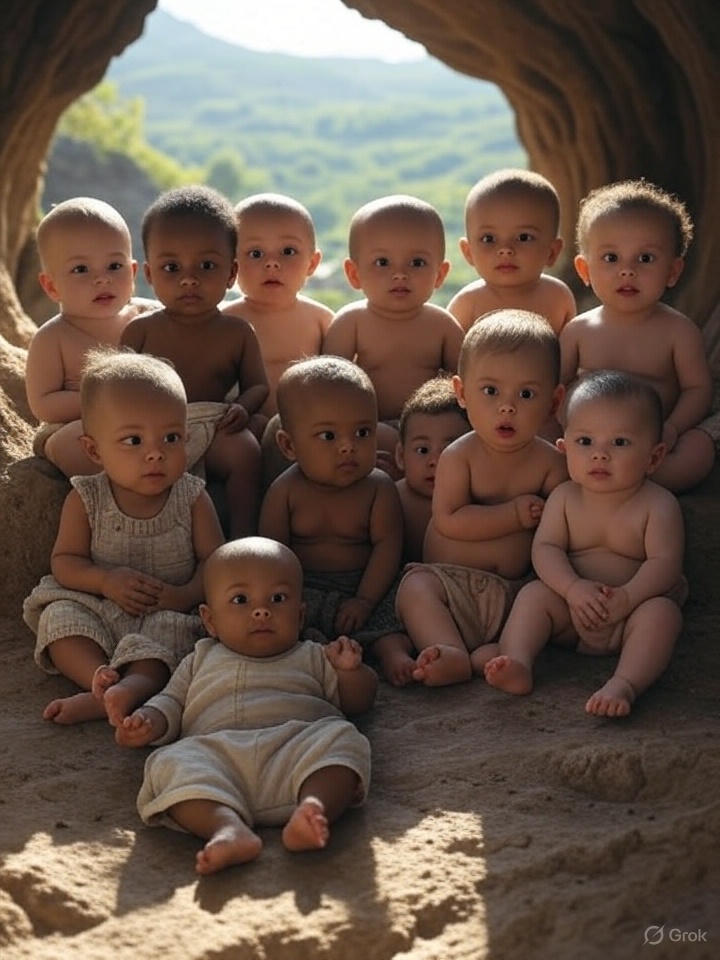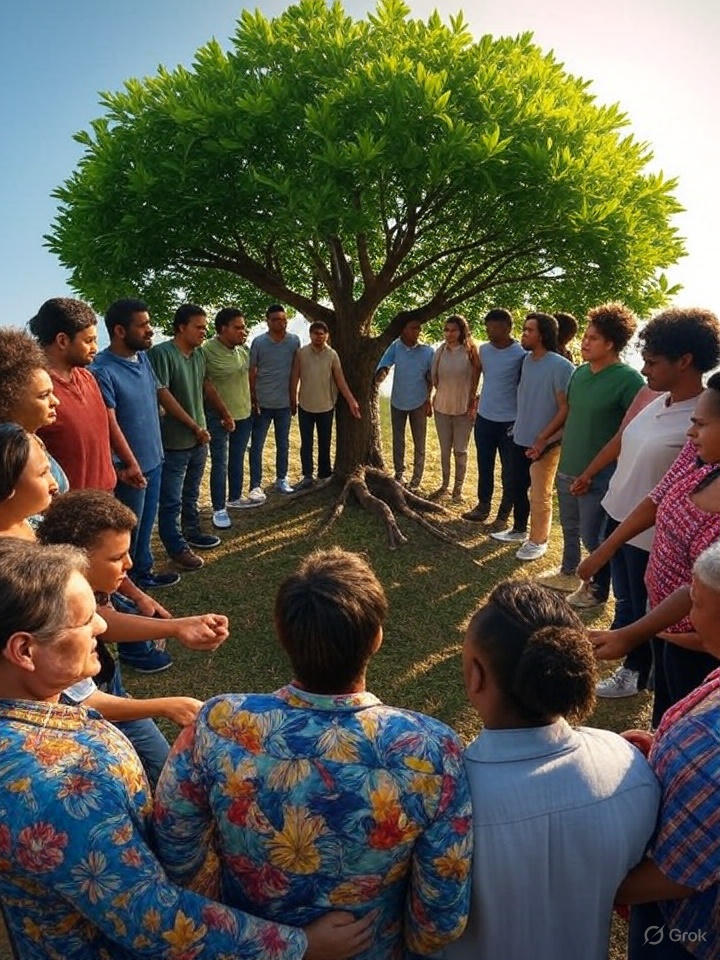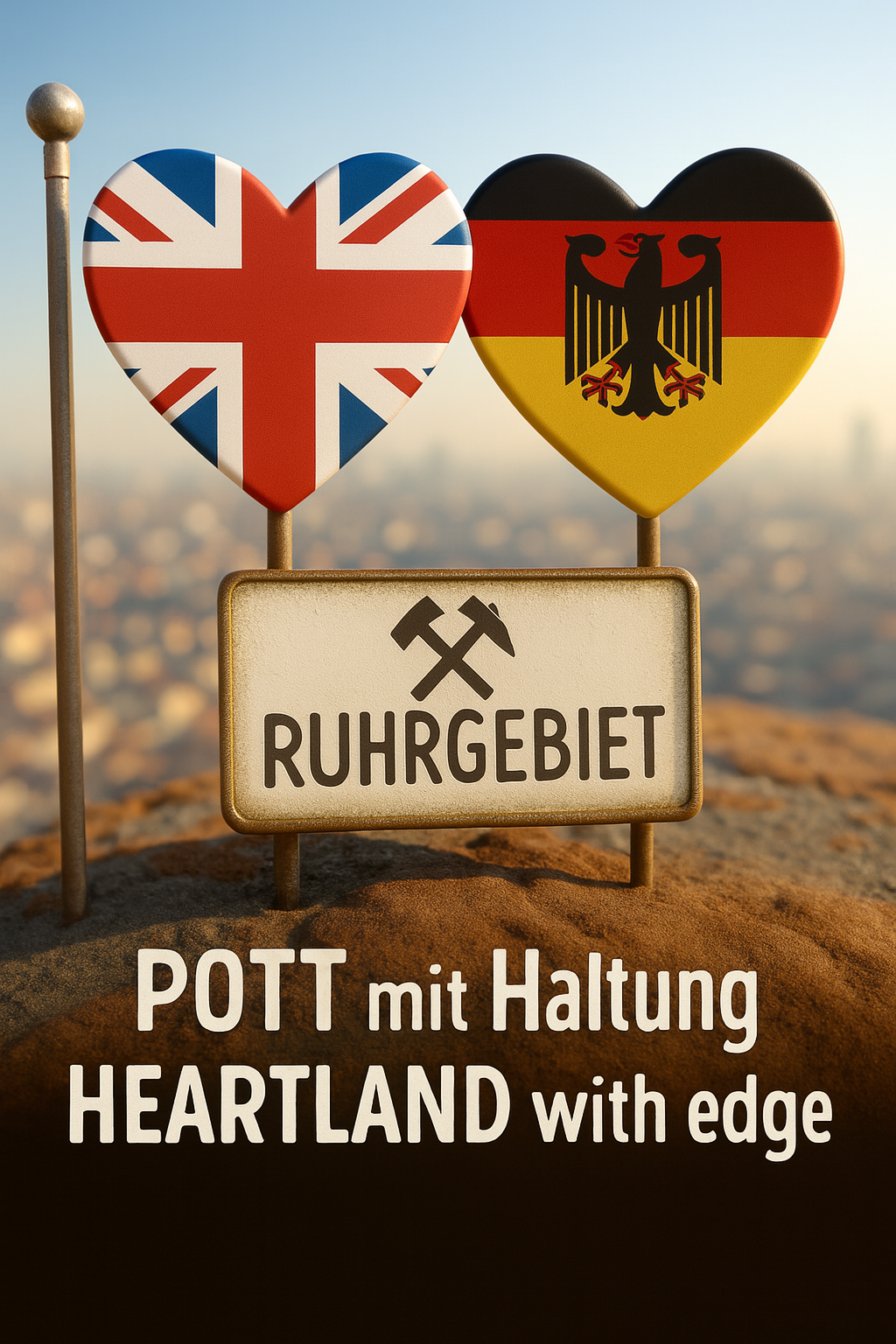Table of Contents
de-DE-Ruhrgebiet: Nationalstaat 2.0 - Update erforderlich
Medium.com publication at: https://medium.com/@cs_33924/cb156f2e75d3
Nation-State 2.0 - An Update Required
Picture this: the nation-state ain't just some bureaucratic box – it's a real invitation to finally start figurin' this whole thing out – together. But why ain't Germany steppin' up to lead the way?
Introduction and Foreword
Hey there, folks,
Take a seat, grab a breather – and take a good look at yourself. Maybe the answer to the big question ain't out there, but right in our own thinkin'. We're livin' in an age of info, data, and constant buzz – but our brains are still runnin' on Stone Age software: Great for huntin' mammoths, but chokin' on world peace.
And yeah – this one's gonna take half an hour. Not 'cause it's complicated, but 'cause thinkin' needs time. 'Cause attention these days bolts faster than a push notification. And 'cause “takin' the lead” in Germany still sounds like a forbidden word. But it ain't about power – it's about attitude.
This might not be somethin' for in-between. More like for a quiet evenin' – with a good glass of wine, an honest beer, or a mate tea for the sound bowl crowd. Maybe even thinkin' of a dear one who's missin' – someone you'd love to share this with.
Everyone in their own way – whatever feels right. But on the way to work, between door and platform edge, it probably won't lead to real reflection. This needs a bit of space – in your head and in your heart.
And if we're honest here at home, we'll notice: We struggle with leadership. We'd rather tinker in the back than grab the wheel up front. Just don't stand out, just don't lead – just keep things neat, but quiet. Like at a parents' meetin': Everyone knows somethin', but no one says a thing.
History? Full of crazy ideas: Fightin' over the last berry or thinkin' one tribe's gotta rule the whole world. Time to delete that old OS – and install a new way of thinkin'.
With a dash of humor and a clear eye, let's shift the view a bit – so thinkin' happens on its own again. And maybe we'll find the guts to take a new path. Not loud, not perfect – but real.
Disclaimer – Context, Stance, Invitation
This text is part of an ongoing experiment: Ruhrgebiet lingo, diversity and a good laugh – served up for anyone up for a bit of thinkin'. It tries to unpack big ideas in a way that sticks — without losin’ their heart. Expect some humor, a bit of pushback, and straight talk.
If you’re readin’ along, you’re in — to think, to grin, to feel a bit. Maybe even to argue back. And if it don’t click — that’s by design.
For more on this experiment, check out my homepage at https://coherentvoices.de/en/ if you’re curious. But to read this text, that’s not a must, just a little extra on the side.
The Cosmic Giggle: Our Spot in the Universe (Spoiler: Tiny!)
Ever wondered how some alien crew might see us? Us eight billion little dots buzzin’ around on a blue marble – always squabblin’ over who gets which sandpile or who’s the big boss? Would they call it a tragic comedy or just a massive brain fart?
The answer’s plain as day: They’d crack up. Not ‘cause it’s funny – but ‘cause our antics look properly ridiculous from out there We’re tiny, fragile – and our strength’s in stickin’ together, not tearin’ each other apart.
Nature – let’s say she’s givin’ us a cheeky wink – thinks in millions, maybe billions of years. Our little dance on this rock, with wars, crises, and frettin’ over the last chip bag, is just a blink to her.
She’s sittin’ there with her giant hourglass, watchin’ us. If we wipe ourselves out, she’ll give a tired smirk, let some green lichen grow for a few million years, and wait for the next bunch – maybe one that gets that dancin’ together beats stompin’ on toes.
Somehow, that thought’s a bit freein’, right? A small step for humankind, a big ol’ laugh for the universe. Makes you humble – but in a good way. And it nudges you to ask: What do we even mean by “greatness” – and do we really need it?
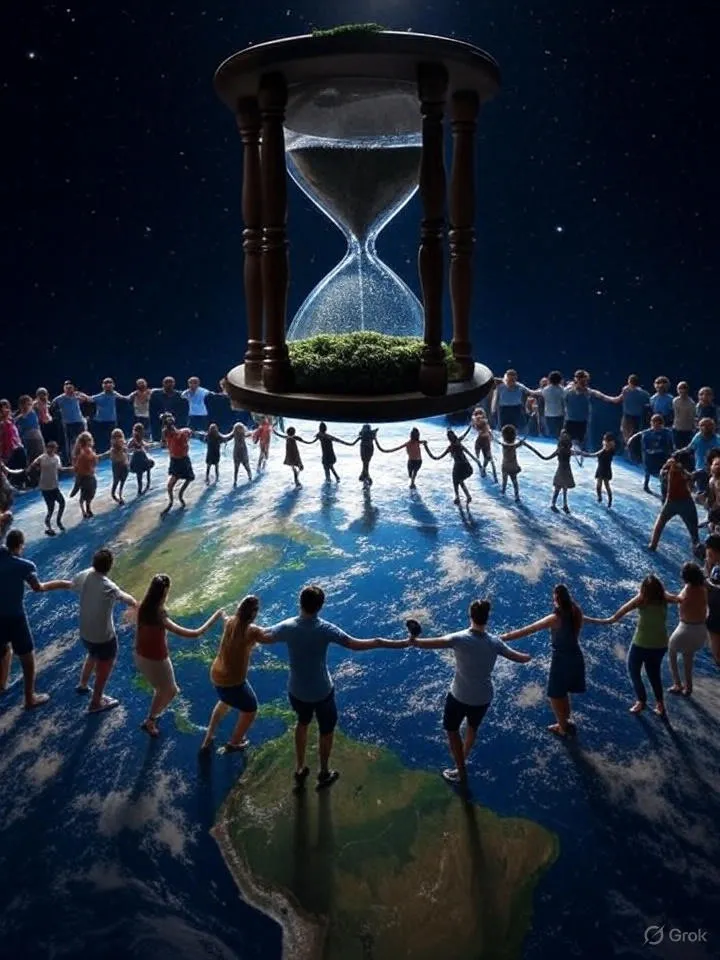
The World Party: We All Fit In! (And Germans Get to Join the Fun!)
So, now that we’ve agreed we’re just a footnote in the cosmos, gonna take a look at somethin’ a bit more down-to-earth: our lovely blue planet. If we’d finally pack away them old chestnuts – centuries of hackin’ at each other and that “my hill’s better than yours” mindset – into the history books, then nothin’ would stand in the way of humankind’s biggest brain bash!
And yeah, dear German readers: We can – and should – join the party. It’s a plain fact that two nasty scraps kicked off from German soil. That hurt the world bad and kept it on edge for ages. These chapters, which we rightly own up to as losses, have landed us with a special responsibility. Out of that came a kinda “rulebook” for global gettin’-along, that still shapes us today.
But this path also left a gap – kinda like a shortage of that easy national pride other countries might feel. Maybe that’s why we sometimes turn into super-thorough paper-pushers, keepin’ things tidy but not always dancin’ through life with a light step – not for ourselves or for others.
But right from this unique spot – from the heart of Europe, with the memory of epic stumbles and a sense of our role – maybe the time’s ripe now. Perhaps it’s time for Germany to stop bein’ seen as a conflict starter, and turn into a darn good idea for global togetherness and a future full of teamwork.
An idea that helps us build a new, grown-up identity and shows we’ve learned somethin’. We wanna shape the future hands-on – not through power hubs like the EU or big corporations, but through insight and attitude.
‘Cause us Germans know all too well: Too much power in too few hands can turn dangerous real quick.
And now, here’s a little thinkin’ nudge: If every person on this planet had their own square meter, we’d need a space about nine times the size of our charming capital Berlin to fit all eight billion souls.
Yeah, you heard that right: The whole human crew fits comfy in nine times Berlin. Right here on Earth!
The rest stays forest, desert, ocean – and of course room for squirrels. Ain’t that a mind-blowin’ picture of “We all fit in!”?
Time to toss our hats in the air, throw a big, imaginary world party, and give our own ideas of scarcity a good, hard look.
The Big „Aha“ Moment: Not Enough Resources? Nah, Our Behavior’s the Real Mess!
Now that we’re standin’ comfy on the globe and clocked that there’s plenty of room, maybe it’s time for a bit of a wake-up call – after centuries of scrapin’ over oil fields, fertile valleys, or golden toilet seats.
Is it really about too few resources? Or ain’t our real problem more about how we act and the way we share? The Earth’s got enough to go around for all – if we divvy it up fair and treat each other with respect. The catch? We’re missin’ the right playbook for human gettin’-along.
Nature’s got a smirk – we all fit, the resources are there. What’s lackin’ is askin’ our inner builder: You wanna build bridges – or walls?
This quiet insight nudges us to take a hard look at all that „fight for survival“ nonsense ourselves. How much of it’s real – and how much is just learned drama?
Revolution? Or More Like a Common-Sense Upgrade?
So, here we stand with our fresh „AHA!“-moment. We’ve survived the cosmic laugh, realized we all fit comfy on this globe, and figured out that resources ain’t the issue – if we didn’t act so… well, daft and unreasonable. This thought takes us a step further – but what do we do with it now?
The gut reaction might be: „Revolt! Clear out the old junk!“ There’s somethin’ to it – a proper cleanup, pullin’ the plug, and seein’ what happens. You can picture us marchin’ off with torches and pitchforks, maybe even cuttin’ the Wi-Fi to force a new order. Sounds wild – but also a bit like a stage play.
But hold up! Before we dive into that dramatic mess, let’s pause and peek at history. It’s packed with examples of what happens when you slam the big „Reset“ button too quick. Most times, you end up with Version 0.5 Beta – a system full of glitches, more bugs than features. What starts as a liberatin’ party can turn real fast into a horror echo, with a heap of human costs – often for goals that seemed noble, but look pretty different in hindsight.
Let’s be real: All the systems, structures, and rules we’ve built have at least got us this far. Today, we can sit with a cup of coffee or tea and chat about our collective „unreasonableness“ in peace – a privilege we owe to evolution, even if the ride’s been bumpy and full of squabbles.
The progress shows in this: We’ve got access to a ton of knowledge today and can think and talk about these issues globally. So: It ain’t rebellion that’ll save us, but insight. We don’t need to smash it all, but can carefully reprogram the good stuff, gently modernize it, and fill it with a fresh spirit.
No cuttin’ cables – that’d be too radical. It’s enough to reshuffle the plugs and install a few updates that shift our old Stone Age OS from competition toward cooperation in the information age.
It’s about gettin’ it: We’re all in the same spaceship. Ain’t it way smarter to tinker on the navigation systems together than to block each other’s seats or even sabotage the controls?
This insight could be the key to keep our journey goin’ – and doin’ it right.
The Big Yawn and the Party-Plannin’ Invite: „We Need to Chat!“
After that cosmic laugh brought us back down to earth, we’ve clocked that we all fit comfy on this blue marble and that there’s enough resources to go around – still, there’s this quiet grumblin’ in the gut.
Why do we keep noddin’ along to rules that are as outdated as a fax machine in the smartphone age?
This collective yawn – the frustration with regulations that don’t match today’s challenges and won’t bring the mammoths back – is actually a good sign. It whispers:
„Watch out, the OS is outdated! Time for an update!“
This yawn ain’t a sign of tiredness, it’s a wake-up call from good ol’ common sense. Think back to the Renaissance: That’s when folks broke out of the Middle Ages – not just with torches and pitchforks, but with ideas, dialogue, and fresh perspectives.
Same goes for us today – we’ve got a shot to reprogram our global get-together – and we don’t need to cut the Wi-Fi to do it.
Now that we’re all gathered in spirit for this world party, the deal’s clear:
We need to chat!
Not yellin’ and arguin’ loud, but rewritin’ the party rules – with an open ear and a smile.
‘Cause let’s face it: Rules matter. We need routine so we don’t all go bonkers. But if we can’t tweak those rules anymore, we’re basically stuck – even with the best intentions. What was meant as a guide can turn into a bloody stumbling block.
So, let’s be straight: Is it really about runnin’ out of space or raw materials – or maybe our behavior needs an update? And if that’s the case: Wouldn’t it be time to rethink and tweak a few rules – so we can actually get somethin’ done? ‘Cause let’s be real: Routine keeps chaos at bay – but only if it grows with us.
UN Briefing: From 8 Billion Voices to One Shared Roadmap
Eight billion voices all at once – that’s a proper handful, even for the loudest yappers among us. A collective „We need to chat!“ would likely end up in a monumental chaos concert, where no one understands a word. Anyone who’s ever waded through comment sections on social media knows exactly what we’re on about.
That’s why humankind came up with somethin’ pretty clever: We pick or appoint reps. Our personal translators and diplomats, who speak for us, negotiate for us, and, if we’re lucky, set the tone for some sense.
And we’ve even got the perfect spot for it – somethin’ we built ourselves after the last big global scrap: The United Nations. Imagine sendin’ folks there who really get on eye level for a proper dialogue. People who don’t roll up with a prepped speech sayin’ why somethin’ won’t work ‘cause it supposedly clashes with national interests.
Instead, folks who honestly try to find somethin’ that works for everyone.
Us Germans know from our own painful lessons that a fresh start can work: After the rubble of our daft decisions, we pulled off a constitution that’s stood the test of time – thanks in no small part to the savvy support of the global community.
And the best part: Today, not everything’s (yet) in ruins – which hopefully makes this a bit easier.
‘Cause if we don’t manage to have this brave dialogue, we’re lookin’ at an endless loop of history. We’ve learned what nature does with species that can’t sort out their conflicts: In the end, maybe only green lichens are left.
But we’ve got the chance to rewrite the script – with insight that invites us to make our own choices.
The Big Life Lottery: Right in the Middle – No Effort Required!
Now that we’re (hopefully) on the same page, that talkin’s the key and we’ve even got some solid role models, we’re hittin’ a core bit of bein’ human that we often forget – or like to shove under the rug:
None of us picked when, where, or into which family we were born.
Picture life like a massive lottery – only we’ve all drawn a ticket, whether we wanted to or not. Sometimes it’s a winner with sunshine and champagne, sometimes a dud with rain and empty promises.
From cradle to grave, we’ve just been plonked somewhere and gotta deal with the hand we’re dealt. No choice, no say – but heaps of expectations.
That’s a fact that often gets lost, when we chat about personal responsibility and global fairness – a quiet nudge to take a hard look at our ideas of „self-made“ success.
So, let’s be straight: How much of it’s really our own doin’ – and how much is just luck of the draw?
What ticket did you pull?
From Mammoth Hunter to Savings-Book Philosopher: Why „Smart Economics“ Matters
Now that life’s startin’ conditions are such a random roll of the dice, it’s all the more crucial that everyone gets a fair shot to better their lot.
And that’s where the economy steps in – a downright brilliant idea: Usin’ resources smart, creatin’ value, and buildin’ a cushion for the tough times. Whoever’s got their finances sorted can carve out a bit of independence and live life on their own terms.
Here’s the catch: Not everyone’s got that privilege. While some are ponderin’ the best stocks to buy, others are scrapin’ by just to survive with no chance to stash a penny.
That ain’t just unfair – it’s downright risky for our global spaceship.
‘Cause folks with nothin’ got nothin’ to lose – and that can spiral quick into despair, daft decisions, and conflicts.
Time to change that – with insight, not force. Real growth kicks off when people get a fair crack to turn their mammoth-hunter ticket into a savings book – with dignity, a future, and some backbone.
And backbone means: Not just lookin’ out for yourself, but thinkin’ about how the whole thing ticks – no matter your local roots, cultural wins, or religious beliefs. ‘Cause smart economics with backbone ain’t some elite game – it’s an invite to build somethin’ together that makes sense for all – for your own growth as much as for the community.
Competition as the People’s Demand Vote: The Smart Wallet Calls the Shots!
Competition’s often seen as the big drivin’ force. And fair enough: When we’re talkin’ markets, it’s like a kinda democracy – where the wallet’s the ballot.
Buyers decide which products and ideas stick around. It’s a bloody brilliant setup, boostin’ innovation – if it works right.
But here’s a big ol’ BUT: This „market democracy“ only holds up if the „voters“ – us consumers – can actually make sensible calls.
It ain’t about chasin’ every trend blind or gettin’ suckered by glossy ads and hype.
It’s about learnin’ through education what’s truly worthwhile – for a self-determined, sustainable life with backbone and a long view.
‘Cause only a clued-up buyer can make a smart choice, that ain’t just good for them, but for the big picture too.
And that’s the kicker: Shoppin’ ain’t just personal – it’s political, social, and green. When you buy, you’re shapin’ the game. Whether you like it or not.
Company Fitness Check: If You Can’t Swim, You Sink… or Get a State Lifeline?
In a perfect world, competition means: Firms adapt or vanish from the market. Those that ain’t innovative or efficient oughta take a dip – that’s how natural selection rolls in a lively economy.
But what do we see today? When companies start stumblin’, the state’s gettin’ called in more and more – whether it’s banks, airlines, or the car industry.
That’s a real pickle: We don’t wanna turn the state into some overblown regulation beast, but in a crisis, we’re quick to lean on it – as the „savior in a pinch.“
It’s a tightrope walk between freedom and security, and we ain’t fully nailed the steps yet. Sometimes it feels like jumpin’ into the deep end with floaties, hopin’ someone warms the water. Or – for the galaxy-savvy among us – like leapin’ out the window with just a towel, trustin’ the spaceship shows up in time (like in the classic *The Hitchhiker’s Guide to the Galaxy* by Douglas Adams – see Wikipedia article).
But with a bit of insight, we can learn to strike the right balance – between ownin’ your mess, smart rules, and figurin’ out when help actually makes sense.
‘Cause let’s be real: Anyone who needs savin’ all the time was maybe never seaworthy to start with.
Competition Between Nations: This Is Where the Fun Stops!
What works a treat with products and services on the market, can turn downright nasty at the state level. Competition between countries ain’t the same as between firms. When a company goes bust, there’s no war or destruction.
But hardcore rivalry between nations can mean exactly that: The wreckin’ of another land, just to prove you’re the top dog.
This kinda pushin’ out the so-called weaker ones brings to mind the core of an ideology that the global community, from its own painful lessons, has marked as dead wrong:
That throws up an uncomfortable question: Are we riskin’ the same – or even identical – devastatin’ patterns creepin’ back into our system?
Do we see that our economic setup, without some tweaks, might keep fuelin’ a logic that lets the nasty cycle of “the strong win and shove out the weak” keep breathin’?
In the worst case, failin’ in this national showdown ain’t just about goin’ broke – it’s about human misery, fleein’, and wreckin’ havoc.
These mass movements are the direct fallout and kick off a spiral that no one wants – but too many shrug off, as long as they’re floatin’ on top.
Our spaceship Earth ain’t a marketplace where the strong just kick the weak to the curb. It’s a shared home, and its dwellers need to get it: Cooperation’s the only way forward that makes sense.
And yeah – that might sound like some world-ethos mush, but when you see how daft we often act, it’s clear: A bit more backbone ain’t a luxury, it’s a must to survive.
The Foundation: Why We All Need a Workin’ Nation-State – And What Ours Could Look Like
Now that it’s clear that we can only steer our spaceship Earth safely together, we sometimes forget that each of us also has our own little cabin on board:
No matter how much we dream of global unity or feel like “world citizens” – the reality is: Most of us rely on a functionin’ state. That’s our anchor, our local ecosystem, that’s supposed to take care of the basics: Safety, infrastructure, education, and a decent way to workin' together.
Without this foundation, every global idea goes down the drain.
Before we hash out the intergalactic UN charter down to the last detail, we should ask ourselves: What does the perfect user manual for a nation-state look like, anyway? And how could the division of tasks between the key players – population, economy, and state – be sensibly sorted out?
Let’s take our own Germany as an example – often loved, sometimes cursed. We’re known for our federalism – lots of little federal states, each with its own head, own culture, and sometimes own rules. A fascinatin’, but also complex setup!
And then there’s the legendary financial equalization between our local states.
A system that, at its core, follows the idea: Strong shoulders carry the weaker ones – rich states balance out poorer ones, so livin’ conditions across the country are halfway even.
The goal is that people don’t have to trail after jobs like migrant workers, but that on-site innovative jobs and structural reforms pop up, creatin’ long-term perspectives.
In theory, that sounds like a solid solidarity principle. In practice, it leads to endless debates too.
Interesting thing is: This equalization spirit has helped formerly weak regions bloom. For example, Bavaria – once farmland, now a high-tech hub.
This development didn’t come just from the free market, but was politically wanted and pushed along by targeted funding.
That’s a lesson that makes us question our notions of “free market vs. state” critically – with attitude, with foresight, and with the guts to ask uncomfortable questions.
When the Innovation Pump Stutters: Ideas Galore, Decisions on Hold?
After Bavaria’s jaw-droppin’ shift from farmland to high-tech heaven – thanks to smart political moves and targeted cash boosts – an uncomfortable question pops up:
What happens when our much-hyped innovation mojo hits a wall? Not ‘cause we’re outta ideas – but ‘cause we can’t seem to pull the trigger on the big, game-changin’ decisions that matter.
This is where a big weak spot shows: We’ve got the vision – but we don’t follow through. Bavaria’s loud push for more innovation spirit and structural shake-ups in the other federal states might just flop if we don’t get our act together. Politically, it’s all laid out nice and clear – but without a workin’ decision-makin’ machine in this federal teamwork mess, it all just fades into thin air. And the changes we need stay stuck.
Instead, our political cooperation feels like the state’s just a day laborer punchin’ the clock. Every year, they set the “needs” for the next round, and with a lotta sweat, they try to scrape the cash together – often leanin’ on new debt.
‘Cause in this logic, the state ain’t seen as a market player, one that builds reserves or minds the bottom line like a company. It’s often got no choice but to rack up debt.
But if the state could act like a market player, it’d have a shot at buildin’ up some savings. That would at least give us minimal reserves for the urgent fix-up of our infrastructure – whose flaws we’re feelin’ painfully these days: Collapsin’ bridges, a Deutsche Bahn timetable that’s gettin’ less reliable by the minute, and a massive repair backlog starin’ us down. The list is endless.
This “management model” for fundin’ the public sector, which strays from the economic playbook, has led to overlookin’ obvious steerin’ and prep flaws. It’s cooked up a parallel logic – but not where folks usually point fingers. Right where the rules are made.
‘Cause the “real” troubles of the population and the economy aren’t even grasped there anymore – by those who set the rules for each other. Welcome to the parallel society of decision-makers.
In the economy, on the other hand, it’s all about investments and the returns that come from ‘em.
If the donor states back then hadn’t just sent money to Bavaria, but really invested, they’d be profitin’ directly from Bavaria’s success today – instead of just hearin’ political “blah-blah.”
They’d have direct economic inflows, financial wiggle room, and could use that to pull off their own needed structural reforms and innovations on-site. Or – if innovations fall short – at least live off their investment.
Sure, they get a “return” today too through the financial equalization between states. But that’s sadly always tied to threats that the setup needs reworkin’ – and of course with a ton of “blah-blah,” ‘cause it’s just a purely political construct.
An invite to improve the whole thing through our own insight – instead of the next talk show round.
The State as Investor: A Different Success Story?
If you take a gander at Bavaria’s rise, it hits you: Targeted investments can transform regions – but only if they’re seen as real stakes, not just handin’ out cash for nothin’.
What would’ve happened if the donor states back then didn’t just send money to Bavaria, but stepped up as investors – with clear returns, measurable payoffs and a share in the success, includin’ a fair say in shapin’ things?
Bavaria would’ve paid back its debts, the other states would have wiggle room for their own reforms today – and power and profits would’ve been shared fair and square.
Not as handouts, not as patronizin’ favors – but as smart teamwork in a shared success tale.
And yeah – Money flowed plenty back then, but shapin’ the future? That often stayed stuck in the glovebox. Maybe ‘cause we agreed that future-shapin’ is the economy’s gig – and the state’s better off focusin’ on the framework.
But if the framework itself is wobbly, polishin’ it won’t do much. Then we gotta rethink the rules too – so stakes become more than a friendly footnote in the coalition deal.
Maybe this is the moment where we don’t just see the state in a new light, but reshape it – as a co-shaper, sharers of responsibility who don’t just let the future happen, but carry it forward.
State Funding Overhaul Reloaded: Why the Old Box Is Startin’ to Creak
Imagine the Länderfinanzausgleich like an old family jalopy: Well-meant, built to take everyone along – but after decades, it’s squeakin’ round every bend, guzzlin’ too much fuel, and makin’ the drivers argue nonstop over who’s tankin’ up next.
In theory, it’s ace: Rich states like Bavaria or Hesse prop up the weaker ones, so no one gets left behind and everyone’s got a halfway fair shot. It builds solidarity and stops folks from traipsin’ around like day laborers chasin’ jobs.
But in practice? Pure friction! Critics (and Bavaria’s leadin’ the charge here) moan that it rewards laziness: Why bother hustlin’ when the bailout’s guaranteed?
The load’s unevenly spread – the „payers“ feel taken for a ride, the „receivers“ often feel patronized.
And real structural reforms? Nowhere to be seen – ‘cause it’s all about redistributin’, not investin’ for returns.
It’s pure polit-speak: Well-meant, but without market-style incentives, it leads to endless debates and bugger-all progress.
Side effects? Frustration, envy, and a system that keeps the „mammoth-hunter mindset“ alive, instead of fosterin’ real teamwork.
Here’s the kicker: The real parallel society ain’t the socially disadvantaged, but those who pat themselves on the back as achievers – yet go dead quiet when it’s time to own up. No more huntin’ then, just countin’, shufflin’, and whingin’.
Time for an update – before the jalopy finally gives up the ghost.
A gentle nudge to take a hard look at our ideas of „solidarity“ – and maybe reshuffle what we mean by „effort.“
‘Cause whoever’s got room to shape things carries responsibility for the whole – not just their own bottom line. And those settin’ the rules oughta know how to build solutions that reach more folks than just their own fast lane.
Maybe this is the moment where „managin’“ turns back into „shapin’“ – with backbone, a long view, and an open eye for those who’d otherwise just be a number on a chart.
The Bavarian Formula
Bavaria’s rise gets quoted a lot – but rarely read right.
Was it really a miracle formula? Or just clever investin’, patience, and a bit of luck? The truth is: Bavaria didn’t just get handed cash – they made somethin’ of it. Shaped it, carried it, thought it through. And paid it back eventually. Not out of duty, but out of pride.
But what’s that mean for the others? For those who gave back then, without gettin’ a say? Who just shoved money over, not knowin’ if there’d even be a glovebox to dig into? The Bavarian formula ain’t: „Chuck money in, success out.“ It is: Thinkin’ along, shapin’ together, carryin’ the load. And makin’ sure it ain’t just the ones with the shiniest image winnin’.
Maybe it was a hearty sausage roll in the end – crisp on the outside, soft within, only tasty with a dab of mustard. But it worked. And that should give us somethin’ to chew on. ‘Cause whoever’s yammerin’ about redistribution today oughta talk about stakeholdin’ too. And those goin’ on about debts should also ask, whether there was ever a real plan for teamwork – or just a quiet hope for a return.
The formula ain’t a recipe. It’s a thinkin’ invite. For anyone who gets that solidarity doesn’t mean: „I pay, you grow.“
But: „We build together – and everyone brings somethin’ to the table.“
When Everyone Wins: The Synergies of a New Way of Gettin’ Along
Picture Germany like a big ol’ orchestra: Everyone’s playin’ their own instrument, but instead of scrappin’ for solos, they’re sharin’ the sheet music – and the takings.
With the Bavarian formula, investors would cash in on the wins: Higher returns fund their own projects, create jobs right where they’re needed, and cut down on folks leavin’ for greener pastures. Incentives? You bet: Everyone’s got a stake in the good life – some bring the innovation, others share their know-how, all grow Investin’ is done where there’s a shot at success – and debt only comes with clear terms.
The payoff? Less jealousy, more stability. Instead of a scrap over handouts, you get a network where successes multiply. Cooperation over competition – and a national identity built on gettin’ along, not dividin’ up power.
Thinkin’ global? A model for the EU or UN – where stakes bring returns, and everyone walks away a winner.
The Big Leap: From Federation to World Community
From Bavaria to the whole wide world – sounds like a quantum jump, but it’s just plain logic. The Länderfinanzausgleich shows how solidarity can roll – if it’s built on stakes and not just handouts. Globally, we’ve got similar messes: Climate finance, Development aid, European Structural and Investment Funds. But too often, the return-on-investment vibe is missin’ – and too much central control opens the door to shady deals.
So what’s the move? Invest instead of just helpin’ – with clear rules, local rights, and a fair share of benefits for all. And that means folks ain’t just allowed to listen, but get a real say – at least 50% plus one share. Otherwise, it’s just a nice idea with a dodgy contract.
But havin’ a say also means: Sharers of responsibility, carryin’ debts, keepin’ power in check. ‘Cause if you’re in on the chat, you gotta do the math too. And if you wanna make waves, you can’t just eye the profits, you gotta weather the storm.
Returns gotta be shared – same goes for power. Otherwise, it’s a one-way street with a fancy facade and a rotten foundation. And that’s exactly what keeps that old mammoth-hunter mindset alive – huntin’, hoardin’, dishing out as you please. High time we break out of that.
Global stakeholdin’ needs more than warm words – it needs real involvement, and a system that don’t just dish out power, but anchors responsibility solid.
And yeah – that’s ambitious. But if Germany’s good at one thing, it’s buildin’ rules that hold up in practice – and maybe it’s time to rethink ‘em now and then, somethin’ we’ve clocked here at home – and maybe it hits other spots too. Gotta be said.
And a quick aside: These stakes can also be seen as reserves – somethin’ you can cash in if bridges, the trains, or other infrastructure need a major overhaul again.
A UN Charter for the Info Age: Cooperation as the Profit Model
The UN as the command bridge? Sounds big – but maybe that’s just what we need.
Charter 2.0: Expand the SDGs, toss in investment principles, returns over handouts. Global projects with real stakes: Countries buy shares, profit together. Mechanisms? Transparency apps, AI checks, straight sanctions for any funny business.
No power grab – just shared responsibility. A lesson us Germans know particularly well.
Cooperation as a model for climate crisis, poverty, peace – no pathos, just an update. Away from that mammoth-huntin’ competition mindset, toward shared returns in the information age.
The world community’s gotta learn to dance – through insight, not force.
The Manifesto of Nation-State 2.0: A Call to Sense (and to Dance!)
In a nutshell: We’re tiny, fit comfy on the globe, and have enough – what’s missin’ is cooperation. And maybe some rules, that ain’t just for the others. From state funding to global stakes, there’s a clear line: Invest, share returns, stop the blah-blah. It’s sensible, doable, and protects against power abuse.
Think of Plato’s cave: We’re starin’ at the shadows of our systems – but there’s one last cave: the one of insight.
Once we’re through that, we’re headin’ into a future together, where nation-states are cooperative cabins on the spaceship – with clear rules, shared responsibility, and enough room for hope, growth, and real action.
Let’s dance, not fight – and head to our kids – they’re waitin’ at the exit already.
Nation-State 2.0: Update installed.
Philosophical Summary of the Text on Nation-States
Introduction
The term „Nation-state“ has been a fixed concept in world politics since the Peace of Westphalia in 1648. It links the idea of a culturally or ethnically cohesive „nation“ with the political structure of a „state“ – resulting in a unit that holds authority over a clearly defined territory.
In this text, it explores the history, the thinking behind it and the current challenges of the nation-state – particularly in light of a world that is increasingly coming together.
Historical Development
The nation-state emerged because the old feudal system in Europe was simply too fragmented. The Peace of Westphalia was a turning point: Territorial sovereignty and „no interference“ were cemented. This allowed states to consolidate their power and define their borders.
In the 19th century, things really took off with nationalism – language, culture, and history as binding forces. Germany and Italy arose from such unification movements.
But: Especially during the colonial era, borders were often drawn with a ruler, with no regard for peoples or cultures. This has led to conflicts that persist to this day – see Africa or the Middle East, where those old boundary lines continue to cause trouble.
Philosophical Foundations
The nation-state sits at the heart of a philosophical tension: Between individual freedom and collective identity.
Hobbes and Locke spoke of the social contract – individuals give up a portion of their freedom, so the state can provide order and security.
Rousseau, on the other hand, emphasized the „general will“ – a shared identity that reconciles the individual with the collective in harmony.
Then there’s Plato with his Allegory of the Cave: People sit in a dark cave, seeing only shadows and mistaking them for reality. The philosopher is to step outside, grasp the true world and inform the others.
Applied to nation-states, this means: People must overcome their narrow, nationalist views to discover greater truths about humanity and good governance.
Current Challenges
Today, nation-states are under pressure: Globalization, migration, and major players like the EU or corporations are eroding the traditional notion of sovereignty.
Climate change and pandemics show: Only collective action can help.
Yet nationalism is makin’ a comeback – see Brexit or populist politics. This often stems from a desire to preserve cultural identity against perceived external threats.
And then there are regions where cultural diversity doesn’t match political boundaries – like the Kurds, spread across multiple states and facin’ significant challenges with the nation-state model.
Reimagining Plato’s Cave
When applying Plato’s cave to nation-states today, the cave is not just an outer structure, but also an inner space – the boundaries within our own minds, in our imagination or ego. Life begins outside – with an open view of the world and a will to collaborate.
Have you ever met a baby that managed on its own? Exactly. Collaboration is not weakness, but our natural starting point – regardless of where you were born. The challenge lies in: Not gettin’ trapped in our own “caves” of prejudice, fears, or narrow-minded nationalism.
True insight – or less esoterically: The desire for growth and development – lies in moving through the world with an open mind and resisting the temptation to retreat into those old shadows.
This way, people and nations can address global challenges together and develop an understanding that extends beyond their own borders.
Conclusion
The nation state is still a solid framework for organizing societies and balancing individual rights with collective identity. But when it comes to global challenges and internal diversity, the model starts to sputter. It’s time to rethink things – not out of defiance, but out of reason.
Through philosophical insights – like Plato’s cave, now re-lit with a miner’s lamp – we can imagine a world where people and states grow, connect, and still live their own quirks and cultures – without fear, without power games, without pathos.
Until then:
Think of the green lichens – they couldn't care less who's in charge. You’re not here to save nature. You’re here to understand your place in it.
And maybe – a real shift on the construction site, an hour at the blast furnace, or just a day where you feel that thinking with your hands can be clearer than any shadow in your head. Because those who work with their bodies often know more about “truth” than those who only talk about it.
And once you’ve grasped that – then you can start to make something of it.
Outclaimer – Transparency, Stance, Afterthought
This text was created with AI as a reflection partner, possibly as an illustrator, but not as the author. There are no financial or institutional conflicts of interest.
Those reading along, are welcome to think – and laugh. And if you stumble along the way: Welcome to the club.
For more on stance, technology, and the author, see:
